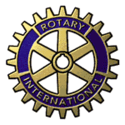Rotary International
|
|
Rotary International is an organisation whose members comprise Rotary Clubs (service clubs) located all over the world. The members of Rotary Clubs are known as Rotarians and are business and professional leaders who provide humanitarian service, encourage high ethical standards in all vocations, and help build goodwill and peace in the world. Their motto is "Service above Self".
PaulHarris.jpg
The world's first service club, the first Rotary Club was founded in 1905 in Chicago by attorney Paul Harris and three other businessmen. The National Association of Rotary Clubs was formed in 1910. The name was changed to Rotary International in 1922 because branches had been formed in many other countries. It has by now spread to 167 countries and now has more than 1.2 million members in over 31,000 clubs. The name Rotary was chosen since meetings were originally rotated to different locales of members of the organization. Members of a specific club meet weekly for breakfast, lunch or dinner, which as well as serving as a time to organise work on their service goals, is a social event.
InteractLogo.png
Interact Logo
Rotary is a non-partisan, non-sectarian organisation. Its membership tends towards the middle-aged and wealthy, although it is open to business and professional leaders of all ages and wealth is not a membership criterion. After years of debate, women were admitted in 1989, and now make up a little under 12% of the membership. Previously, women were able to join a linked organization for the wives and daughters of Rotarians, the Inner Wheel. Many Inner Wheel groups still exist. Other Rotary sponsored organisations include: Rotaract - a service club for young men and women ages 18 to 30 with over 175,000 members in 7,500 clubs in 155 countries; Interact - a service club consisting of more than 220,000 young people ages 14-18 with over 9,600 clubs in 117 countries; and Rotary Community Corps (RCC) - a volunteer organisation with an estimated 103,000 non-Rotarian men and women in over 4,400 communities in 68 countries.
Rotary Membership is by invitation from a current Rotarian, to professionals working in diverse areas of endeavour. Each club can have up to ten per cent of its membership representing each business or profession in the area it serves. The goal of the clubs is to promote service to the community they work in, as well as to the wider world. Many projects are organised for the local community by a single club, but some are organised globally.
The role of Rotarians in the power structure of the United States has often been noted (C. Wright Mills, The Power Elite [Oxford UP, 1956], p. 37).
The most notable current global project, Polio-Plus, is contributing to the global eradication of polio. Since beginning the project in 1985 Rotarians have contributed over US$500 million and tens of thousands of volunteer man-hours, leading to the innoculation of more than one billion of the world's children. Inspired by Rotary's commitment, the World Health Organization (WHO) passed a resolution in 1988 to eradicate polio by 2000. Now in partnership with WHO, UNICEF and the US Centers for Disease Control and Prevention, Rotary is recognized by the United Nations as the key private partner in the eradication effort.
Other of Rotary's most visible programs include Rotary Youth Exchange, a student exchange program for students in secondary education, and Rotary's oldest program, Ambassadorial Scholarships. More than 30,000 men and women from 100 nations have studied abroad under the auspices of Ambassadorial Scholarship, and today it is the world's largest privately funded international scholarships program. In 2002-2003 grants totaling approximately US$26 million were used to award some 1,200 scholarships to recipients from 69 countries who studied in 64 nations.
Starting in 2002, The Rotary Foundation partnered with eight universities around the world to create the Rotary Centers for International Studies in peace and conflict resolution. The universities include International Christian University (Japan), University of Queensland (Australia), Sciences Po (France), University of Bradford (United Kingdom), University del Salvador (Argentina), University of North Carolina (USA), Duke University (USA), and University of California, Berkeley (USA). Rotary World Peace Scholars complete two year masters level programs in conflict resolution, peace studies, and international relations. The first class graduated in 2004 [1] (http://www.rotary.org/foundation/educational/amb_scho/centers/index.html). Rotary celebrated its centennial anniversary on February 23, 2005.
External links
- http://www.rotary.org
- http://www.rotary.org/foundation/polioplus/
- http://www.polioeradication.org/de:Rotary-Club
eo:Rotario fr:Rotary International id:Rotary Club pt:Rotary International


